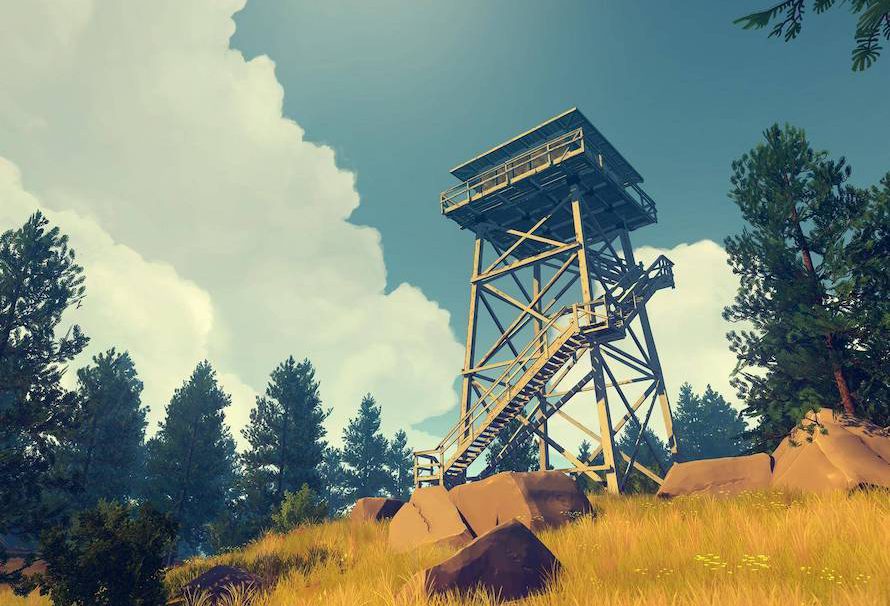It’s been five years since game development supergroup Campo Santo launched its first game, the indie adventure Firewatch. The studio has been on a long road since, and has now been absorbed into Half-Life creators Valve. The studio’s talent has most recently lent its skills to the 2020 VR game Half-Life: Alyx, with its fascinating archaeological follow-up project In the Valley of Gods caught in development limbo.
To mark the anniversary of Firewatch, we’re going to offer a retrospective of the game, and talk about its most famous ending. As you may know if you’ve played it, Firewatch is constructed to tell a story that purposely fights against typical video game narrative logic and the very nature of explaining an ending. Regardless, hopefully you can get something out of our exploratory take on the game’s riveting conclusion!
Firewatch Retrospective

You rarely play a game as singular as Firewatch. The game is a powerful short story, but one that could only be told through the adventurous medium of video games. There’s no high-intensity tactical action or any of the typical epithets that make video games pump a player’s adrenaline, but Firewatch manages it all the same through the way it tells a gripping story. You’ll spend your time exploring a gorgeous forest, carefully unravelling a “mystery” with great emotional consequence by studying assets and choosing how to speak to your lookout companion.
Beyond the narrative, Firewatch is further propped up by its superb voice-acting and a charming, detail-rich art style that has ensured the game has easily stood the test of time. A dedicated next-gen port would be awesome, but it’s certainly not necessary! Going back to it on PC, it was clear to me that this is one of those games we’re going to be talking about for many years to come. If you’re yet to give it a shot, I envy you! And if that’s the case, now’s the time to nick off and play it, as we’re about to enter spoiler town…
Firewatch Ending Explained

Firewatch is about Henry, a happily married man whose wife unfortunately develops dementia at an early age. In the wake of the news, he takes a job as a lookout at a national park, and while getting to grips with the role (and encountering some suspicious cases of missing people) he starts speaking with a fellow lookout called Delilah. Their chats develop over time, blossoming into a potentially romantic relationship.
Entering the final third of the game, there’s a great amount of misdirection. The game weaves multiple stories around the player to keep them on their toes as they explore the forest. The main thread players latch on to is a conspiratorial mystery that would so conveniently explain what’s happening in the park at large. As Firewatch starts to end, our protagonist finds transcripts of his conversations with Delilah. He later stumbles onto a spooky government research station — are they being monitored? Is this a setup?
The next step in any player’s brain is to connect the dots — could this have been related to the murky disappearance of the forest’s visitors, the set of teenage girls and child of a former lookout Brian Goodwin? It’s the perfect solution that the brain might jump to in a situation such as this in real life, rather than accepting the grim reality of it, which we quickly encounter.
And I think this is the point Firewatch is trying to make — it’s deconstructing the narrative logic of video game endings, delivering a resonant anticlimax that we can all relate to. Many players have said they don’t get it, or are disappointed at the harsh reality of it — but I think that’s the point, and it’s legendary because of that. Many movies and other forms of media dare to end their tales in anticlimax, but video games (a far younger medium) rarely do, as they deal so much in the adrenaline of input. It’s not really in their nature to wrap up without making the player feel good and rewarded, and that’s why Firewatch’s ending feels so alien.
As the story wraps up, Henry stumbles onto Brian Godwin’s corpse in an abandoned cave. He wasn’t snatched by the government, he died due to an accidental climbing accident, when he was left to explore without supervision. His father Ned has been living a bleak, guilt-ridden existence in the park ever since, and left the transcripts to scare Henry into stopping his investigation, which explains all of the suspicious activity so far. We also learn the government’s research was otherwise innocuous — it was all a red herring.
Firewatch then doubles down on its narrative ambitions with the ending scene. After teasing a potential relationship between the wandering Henry and his unmet partner Delilah, you get to her location finally and she has purposefully left before Henry could meet her. Delilah reflects on their absurd adventure and ultimately tells Henry to go back to his wife. They both evacuate individually as a fire consumes the forest. Roll credits. That’s Firewatch. The guy doesn’t get the girl as you may have been expecting — and there’s no saccharine ‘Return of the Jedi’ victory scene where everyone gets a medal for solving the big problem.
Firewatch just ends, in a way that feels mundane but refreshingly human. That’s the game, and that’s the point! By eliciting such a reaction from its players, and warranting explanation of its very clear-cut ending, Campo Santo has ultimately proven its point. People would rather believe a comforting lie than face the difficult truth, There was no conspiracy, there was no spark, and Henry should go back to care for his ill wife. Boring, you might say. I’d argue Firewatch is the exact opposite.

